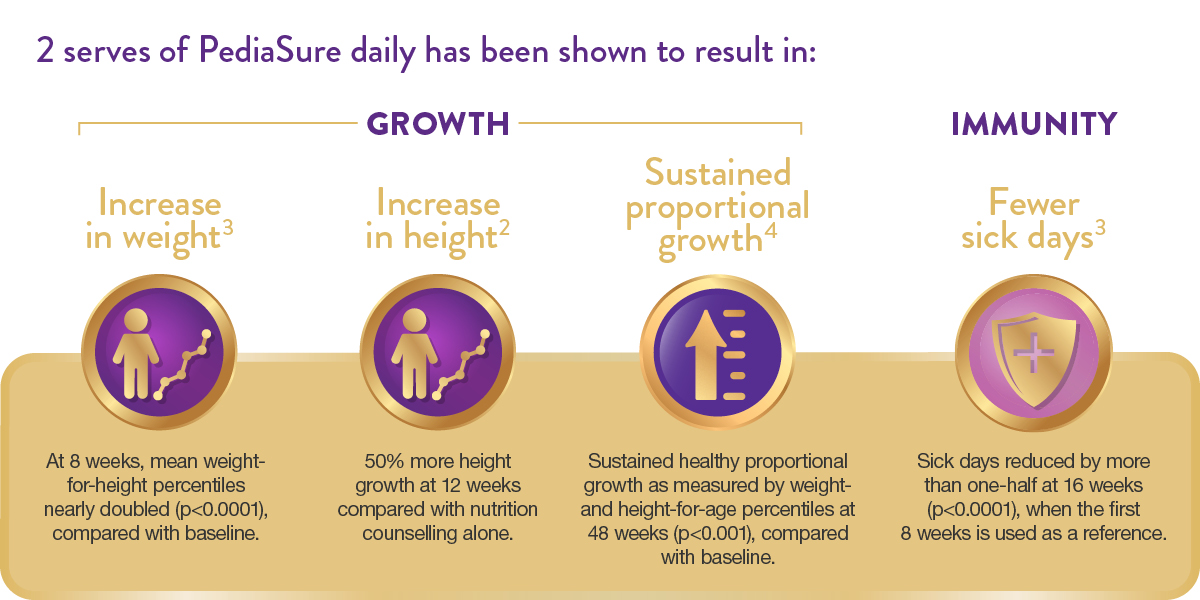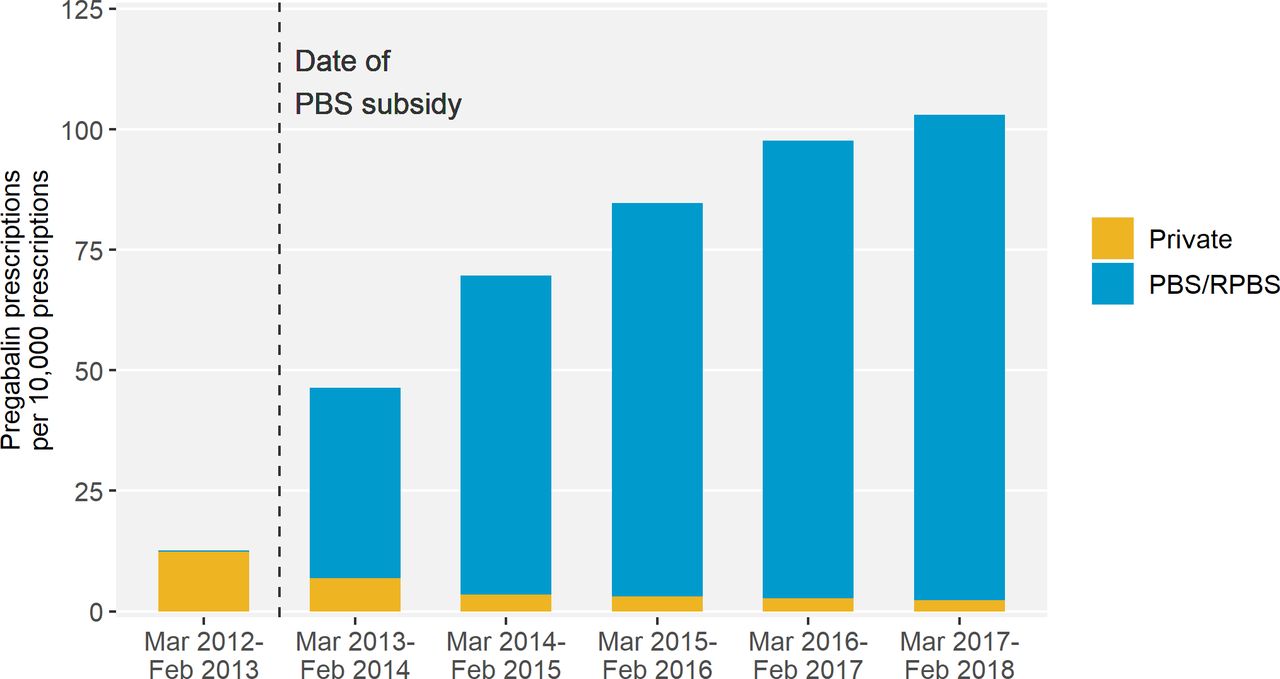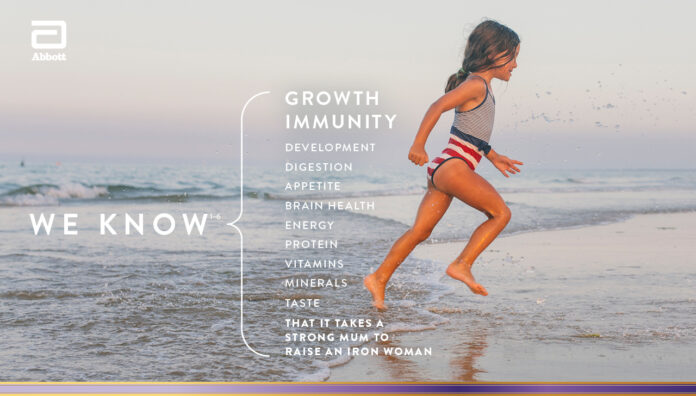ADVERTORIAL BY ABBOTT
Unpredictable eating habits in kids is a problem facing many Australian parents, every day. With more than 25 years of research in childhood nutrition, we’ve learned a thing or two about helping kids grow and thrive through great nutrition.
We know Aussie parents want what’s best for their kids.
We also know giving kids what’s best for them isn’t always easy – especially when it comes to a nutritious diet.
What are the risks of suboptimal nutrition to a child’s growth and development? What’s clinically proven as an effective solution? And how can parents support growth, development and immunity in their kids?
Let’s start with what we know.
1. We know 9 out of 10 Aussie kids aren’t consuming their recommended daily fruit and vegetable intake.7
And we know it’s not through lack of trying. In fact, up to two-thirds of parents identify their kids as ‘picky’ or unpredictable eaters.8
2. We know growing children have nutritional demands that can be up to six times greater than adults.9
For every kilo of bodyweight, kids need up to six times more nutrients than us grown-ups. That’s a lot of nutrition – all to support optimal growth, development and immunity at every milestone.
3. We know that without proper nutrition, picky eating can lead to10-13:
- Growth issues10
- Increased risk of illness and infection11
- Delays in mental health12
- Psychological and psychosocial impairment.13
Making it harder for them to reach key developmental milestones along the way.
4. We know many Aussie parents are concerned about their child’s nutritional intake.
And with so many kids missing out on the vital nutrients they need, it’s no wonder they’re seeking a simple solution (that even the most unpredictable eaters will love).
So, what’s the solution?
We know there’s no one size fits all solution when it comes to giving kids a healthy head start. Every kid’s needs are different, and (as any parent will tell you) these needs can change over time.
What we also know is what has been proven, by more than 20 clinical studies in more than 2,000 children, over 25 years.14
PediaSure provides complete, balanced nutrition, including 28 essential vitamins and minerals1, to support growth, development2–4†, and immunity.3,5 PediaSure has been clinically proven to deliver multiple benefits for children, in just two serves a day2-4.
Let’s take a look at the benefits.

PediaSure support kids as they grow, with:
Unique triple protein complex1:
- Sustained release of amino acids needed for energy, growth and development15
- Helps support the immune system as a child grows.11
Synbiotic1:
- Prebiotic fibre (FOS) and probiotic (Lactobacillus acidophilus) to support a healthy gut and immune system.16
28 essential vitamins and minerals1:
- Vitamins A, D, C and zinc, all proven to support immunity17–19
- Iron and zinc positively influence appetite.20,21
Healthy fat blend1:
- Essential fatty acids
- MCTs for easy absorption 22
- DHA to support brain and central nervous system6
Advanced carbohydrate blend, for long-lasting energy.9
With more than 25 years of research in childhood nutrition, we know what growing Aussie kids need.
Which is why PediaSure provides complete, balanced nutrition, including 28 essential vitamins and minerals1, to support growth, development2–4†, and immunity.3,5 PediaSure is trusted by Aussie parents* who want to be sure they are meeting their child’s nutritional needs.
Recommend PediaSure as the proven choice for parents concerned about their child’s nutritional intake.
PediaSure is available only from quality pharmacies.
References
- PediaSure®Product Label (Vanilla).
- Alarcon PA, Lin LH, Noche M Jr, et al.Effect of oral supplementation on catch-up growth in picky eaters. Clin Pediatr (Phila) 2003;42(3):209–17.
- Huynh DT, Estorninos E, Capeding RZ, et al. Longitudinal growth and health outcomes in nutritionally at-risk children who received long-term nutritional intervention. J Hum Nutr Diet. 2015;28(6):623-35.
- Huynh DTT, Estorninos E, Capeding MR, et al. Impact of long-term use of oral nutritional supplement on nutritional adequacy, dietary diversity, food intake and growth of Filipino preschool children. J Nutr Sci 2016;5:e20.
- Fisberg M et al. lnt Pediatr 2002;17(4):216–22.
- Lauritzen L et al. Prog Lipid Res. 2001;40:1–94.
- Gasser C, Evans-Whipp T, Terhaag S. The physical health of Australian children. In: G. Daraganova, N. Joss, eds. Growing up in Australia – the longitudinal study of Australian children, Annual Statistical Report 2018. Melbourne: Australian Institute of Family Studies; 2018.
- Abbott U&A Research. 2018.
- Nutrient reference Values for Australia and New Zealand. Nutrients. At: www.nrv.gov.au/nutrients. Accessed September 2020.
- Ekstein et al. Clin Pediatr (Phila) 2010;49(3):217–20.
- Scrimshaw NS. Historical concepts of interactions, synergism and antagonism between nutrition and infection. J Nutr 2003;133(1):316S–21S.
- Chatoor I, Surles J, Ganiban J, et al. Failure to thrive and cognitive development in toddlers with infantile anorexia. Paediatrics 2004;113(5):e440–7.
- Zucker N, Copeland W, Franz L, et al. Psychological and psychosocial impairment in preschoolers with selective eating. Pediatrics 2015;136(3):e582–90.
- Abbott Nutrition Data on File (CCD).
- Paul G. The rationale for consuming protein blends in sports nutrition. J Am Coll Nutr. 2009 Aug;28 Suppl:464S–472S.
- Schrezenmeir J, Heller K, McCue M, et al. Benefits of oral supplementation with and without synbiotics in young children with acute bacterial infections. Clin Pediatr 2004;43(3):239–49.
- Ross AC. Vitamin A and retinoic acid in T cell–related immunity. Am J Clin Nutr 2012;96(5):1166S–72S.
- Peelen E, Knippenberg S, Muris AH, et al. Effects of vitamin D on the peripheral adaptive immune system: a review. Autoimmun Rev 2011;10(12):733–43.
- Maggini S, Wenzlaff S, D Hornig. Essential role of vitamin C and zinc in child immunity and health. J Int Med Res. 2010;38(2):386–414.
- Stoltzfus RJ, Chway HM, Montresor A, et al. Low dose daily iron supplementation improves iron status and appetite but not anemia, whereas quarterly anthelminthic treatment improves growth, appetite and anemia in Zanzibari preschool children. J Nutr 2004; 134(2):348–56.
- Krebs NF et al. Am J Dis Child 1984; 138:270–73.
- Shah ND, Limketkai BN. The use of medium-chain triglycerides in gastrointestinal disorders. In: Parrish C ed. Nutrition Issues In Gastroenterology, Series #160. 2017. At https://med.virginia.edu/ginutrition/wp-content/uploads/sites/199/2014/06/Parrish-February-17.pdf
*PediaSure Brand Research September 2020. †In children at nutritional risk.
Abbreviations: DHA: docosahexaenoic acid; FOS: fructooligosaccharides; MCTs: medium-chain triglycerides
Food for Special Medical Purposes. Use only under medical supervision. ®Registered trademark of the Abbott Group of Companies. 299 Lane Cove Road, Macquarie Park NSW 2113. ABN 95 000 180 389. Customer Service 1800 225 311. www.abbottnutrition.com.au. ABN 95 000 180 389. Bastion Brands ABAU4989. October 2020. ANZ.2020.9323.PDS.1 (v1.0)



 Source – Pregabalin prescribing patterns in Australian general practice, 2012–2018: a cross-sectional study[/caption]
Source – Pregabalin prescribing patterns in Australian general practice, 2012–2018: a cross-sectional study[/caption]

 National Medicines Symposium 2024 speakers (L to R): Steve Waller, Professor Jennifer Martin, Professor Libby Roughead, Tegan Taylor[/caption]
National Medicines Symposium 2024 speakers (L to R): Steve Waller, Professor Jennifer Martin, Professor Libby Roughead, Tegan Taylor[/caption]


 This CPD activity is sponsored by Reckitt. All content is the true, accurate and independent opinion of the speakers and the views expressed are entirely their own.[/caption]
This CPD activity is sponsored by Reckitt. All content is the true, accurate and independent opinion of the speakers and the views expressed are entirely their own.[/caption]









